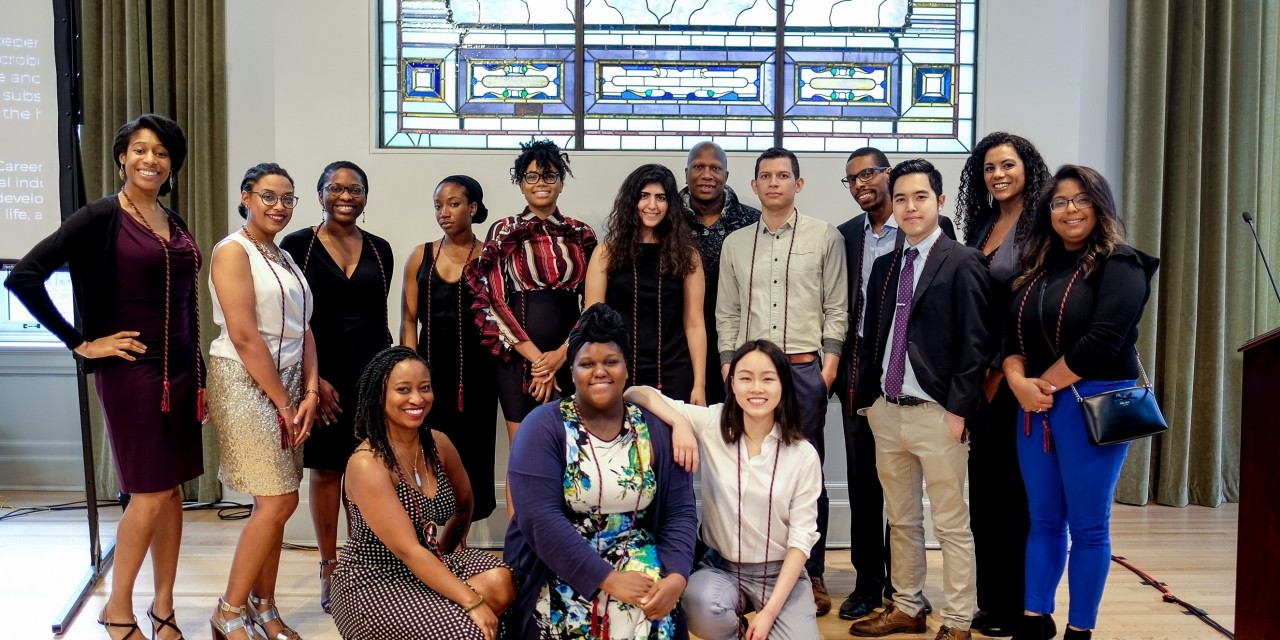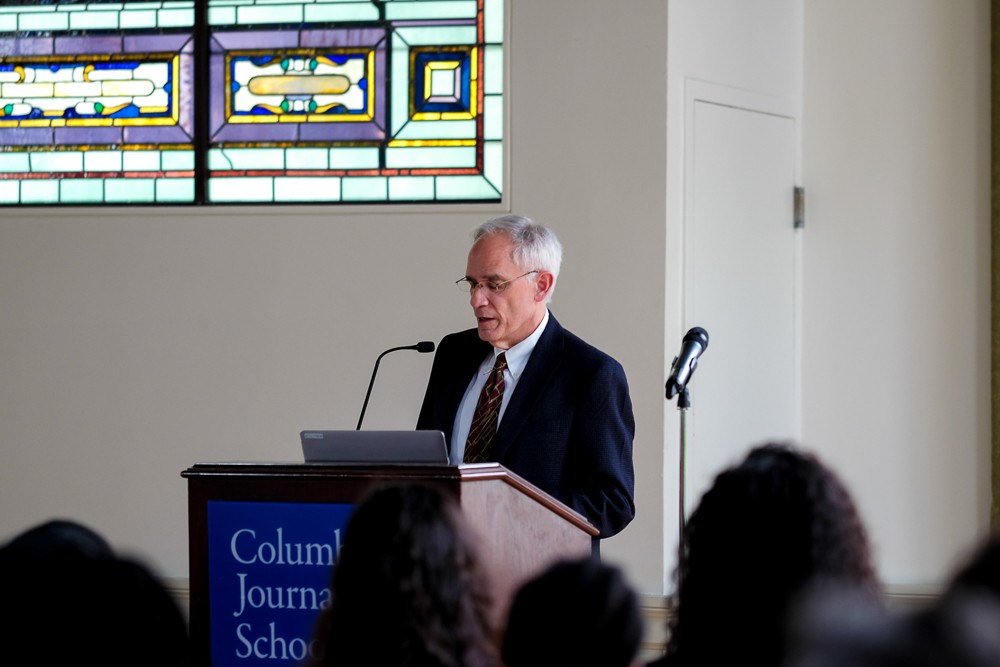2019 SoCA Graduation Ceremony

Twenty-seven graduating MA and PhD students—and the family, friends, and faculty who have supported them throughout their academic careers—gathered to celebrate at the second annual Students of Color Alliance (SoCA) Commencement ceremony, held on May 17 in Pulitzer Hall. The event supplemented school- and university-wide graduation ceremonies by providing a venue for graduate students of color to celebrate their collective as well as their individual achievements.
Carlos J. Alonso, Dean of the Graduate School of Arts and Sciences, gave welcoming remarks. A transcript of his remarks as delivered is below.
The student remarks were delivered by Alexandra Mathieu, SoCA Programming Chair and PhD Candidate in Political Science. Celina Chatman Nelson, Associate Dean for Academic Diversity and Inclusion, shared that the first Devon T. Wade Mentorship and Service Award, in recognition of the achievements of the late Dr. Devon T. Wade, would be announced at Convocation two days later. (This award was given to Joss Greene, PhD Candidate in Sociology.)
The keynote speaker, Porsha Olayiwola, Poet Laureate of Boston, spoke movingly and powerfully about her upbringing and the importance of self-love, affirmation, and celebration, especially in times of real or perceived threat to our very humanity. A self-described "poet, queer-dyke, hip-hop feminist, and womanist," she shared several deeply personal spoken-word poems to the great delight of the audience.
Closing remarks were delivered by SoCA co-chairs Elise McKenna Myers, PhD Candidate in Earth and Environmental Sciences and James Martin, PhD Candidate in Biological Sciences, followed by a festive reception.

Welcome Remarks by Dean Carlos J. Alonso
Good afternoon, and welcome to the second Students of Color Graduation of Columbia's Graduate School of Arts and Sciences.

Welcome to all graduating students and their families, who have traversed with them the demanding academic journey whose end we mark and rejoice about today. It is not mere words to say that, without your families, you could not have accomplished the achievements that we are celebrating today!
Last year’s first SoCA Graduation was a bittersweet event, tinged by the sadness of the then recent death of our beloved student, friend, and colleague Devon Wade. To recognize Devon’s life and achievements, the Dr. Devon T. Wade Mentorship and Service Award will be awarded this year for the first time at Convocation for PhD students this coming Sunday. This annual award will guarantee that Devon’s qualities and activism will be woven into the fabric of graduate student life at Columbia —something that I imagine would have pleased Devon immensely.
Today we celebrate the achievements of the GSAS students of color who have finished their course of study and who have fulfilled all of the requirements prescribed for the degrees in the academic programs in which they enrolled, be it the Master's or the doctoral degree.
But it bears underscoring that these students have done much more than just comply with stipulated requirements for their degrees. We would like to think that the university is a great democratic leveler, the consummate example of a fully meritocratic institution in which effort is rewarded irrespective of who produces it and where rewards are finely attuned to achievement. This is a myth that has been challenged to the core recently by the admissions scandals that have further eroded the standing of some of our most renowned universities and colleges. But how could this mythology of meritocratic recognition be real, when the university does not exist outside society, even if one of its other founding myths is that of the university as separate realm from society. The university cannot be immune to the problems that plague the social milieu, and we should not be surprised when the institution shows explicitly that it is indeed part of the world with all of its prejudices, assumptions, and injustices.
And yet, what attracts a great many of us to the university —and some of us have never been anywhere but in a university— is precisely that one of the core beliefs of the university as an institution is that it is a space where its members can demand more from one another and from themselves as a community than what would be the case out there, in the world at large. The university is a continuous, persistent experiment in social transformation that holds itself to higher standards, even if time and again it fails to live in full consonance with those standards. That is the attraction that the university represents for us and to us; the possibility of making a claim based on ideals of community and fairness that would not be universally accepted outside of the confines of the university. Higher education is not immune to market forces, but it is also true that the modern university is one of the few remaining contexts in which the imperative to commodify everything is resisted on a daily basis.
But this is also why the idea of the commons, of the affirmation of a communitarian ideal is still routinely invoked in the university when it has lost almost all of its purchase in the public sphere. The university belongs to the people within it, as well as to the alumni who graduate from it. And since graduate school is the context in which the university reproduces itself as an institution, all of us who contribute to the graduate enterprise of the university decide with our daily acts what kind of future configuration the university will have. It is hard work being a student, faculty, or administrator in a university, because we are all holding one another to a higher standard than what we could assume as a given in the world outside.
I mention all of this because this second Students of Color Graduation is an occasion of great joy, but it is a joy that arises from the undeniable fact that being a graduate student at Columbia is not a condition that is lived by all students as the same, interchangeable experience. Not all students have their belonging in this institution questioned, their movements monitored at times, their achievements challenged, even if there is no outright malice involved. This event is a recognition of those shared difficulties and obstacles as much as it is an acknowledgement of the shared satisfaction in persisting beyond those impediments. But addressing continuously the existence of those obstacles is a challenge that we must all accept as a community, and overcome as a community. Those of us who will remain here after you graduate celebrate your accomplishments today, and pledge to continue that work of creating a more just community after you have left. My warmest congratulations to you all!
Events such as this one do not plan themselves spontaneously, of course. I would like to end by recognizing the tireless effort of the SoCA committee that planned this celebration, whose effort I ask that we recognize now with a heartfelt round of applause.
